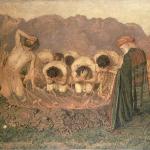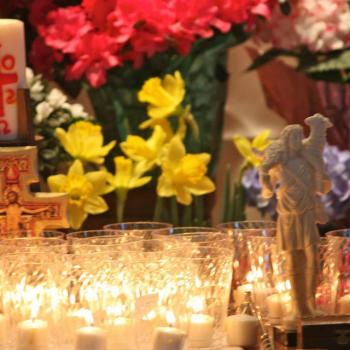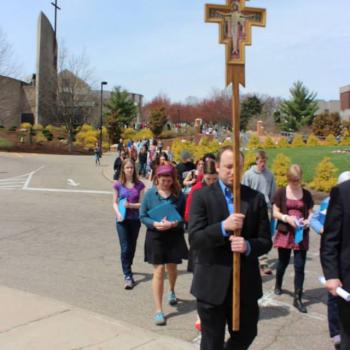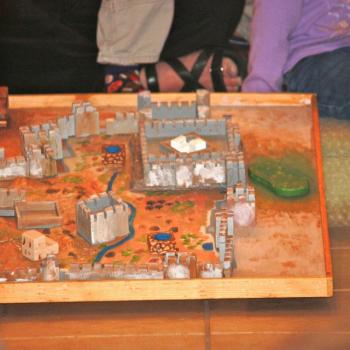
The Lives of the Saints:
“I had to call, even though I’ll see you in a couple days, because I don’t want to forget,” said my friend. “Last night this guy told me that St. Gemma prayed to lose her sense of taste. He told me he’s 70% certain about it. Isn’t that amazing?”
“Yes,” I said, “I’m amazed.”
My friend knows that radiation to my tongue destroyed my sense of taste about a year ago and that I’ve been grieving its loss. Her call sent me down the wormhole of internet hagiography on Gemma Galgani, the young woman whose luminous face tips forever upward to catch the beams of heaven. After combing through various internet sources, I found this: “She begged Jesus that He would ‘so…deaden in her the sense of taste that she could no longer discern any flavor in what she ate or drank’, shortly after which ‘the organs of taste at once lost their sensibility; and she never after perceived any particular flavor whatever in food or drink (Fr. Philip Coghlan, C.P., Gemma Galgani: A Child of the Passion, pg. 43, quoted by Edward B. Abdallah).” So, Gemma had asked for (and was granted!) the very particular suffering from which I’d liked to be delivered. Great.
She also received the stigmata, which were renewed each Thursday at 11pm, when her sores would flow with fresh blood until 3pm every Friday. One time, when she required surgery, she refused anesthesia, enduring the cutting and sewing of her skin, without even a piece of leather to bite on.
My surgeons cut a flap from my left wrist and used it to rebuild my tongue after they’d carved the cancer out of it (I agreed to – and was given – general anesthesia for the procedure). That happened in December 2017, over a year ago, and my wrist still aches. Though I received oxycodone every four hours during the two weeks immediately following the surgery, the pain ripped open my entire arm, as if clawing with a thousand talons, each covered in millions of smaller barbs, which in turn were each coated with stinging nettles, or tear gas, or some deadly, poisonous spider venom. The pain caused me to hear a rhythmic, hallucinatory composition of the most vicious screeches, squawks, and hissings, whose lyrics, repeating all hours of the day and night, involved something to do with Batman. When my doctor inquired if I needed anything, I asked him to turn off the music. He said, “Music?” and then, “Oh, you mean the noise of the machines and monitors!” and laughed at my wit. My wit!
I marveled that a single wound that hadn’t even pierced me through, could generate such agony when Jesus had had nails driven through both of his wrists, and his feet. St. Gemma had relished sharing this experience of excruciating torture with him, but that wasn’t enough for her: she asked God to remove her sense of taste into the bargain.
The Church uses funny criteria to assign patronage. Take St. Apollonia, who is the patron saint for those suffering from tooth pain because a violent mob, “by repeated blows, broke all her teeth.” Do you think she maybe rolls her eyes when she hears a petitioner ask, “Please ask God to miraculously heal my cavity. I hate to get fillings because novocaine makes me drool embarrassingly…”? When her tormentors built a pyre and threatened to burn her alive, St. Apollonia broke away and voluntarily jumped into the flames to deprive them of the pleasure of setting her afire. Perhaps we’re meant to feel abashed for complaining about our petty trials to someone so fierce.
St. Gemma, I’m 70% sure that you wouldn’t approve of me asking you for help to recover my sense of taste. I guess I’ll ask for the usual, then: beg God to send me the miracle, whatever form he wishes it to take.
Bridges
Over Christmas break, one of my daughters, upon hearing about a younger sister’s friend drama, offered to play her a song that might be of help. Without any other introduction, she pressed a button on her laptop and this song drifted from its speakers:
Somehow, hearing this song rips a hole in spacetime, and twenty-nine years evaporate: It’s 1989, I’m not yet married, and my coursework for the Masters in Social Work consumes most of my time. In my secret heart, I’m conflicted about this vocation. I daydream about the film adaptation of my second novel, The Saint George Hotel, and imagine that Tracy Chapman’s “Bridges” will play over the opening credits as my main character, Annie Root, with her hair in two black braids, her jeans ripped at the seams, and her plastic grocery bag of belongings, swings up into the Greyhound bus at Philadelphia’s 30th Street Station. I can visualize the silver flank of the bus, parked at a 45 degree angle, the small hop Annie must make to land on the first step, and the mustachioed face of the driver, slightly out of focus behind her. I wonder what actor they’ll get to play the role of Annie…
Brought back to the moment with my daughters, I told them about the imaginary film adaptation to the novel that was never published. I hadn’t introduced them to these songs, but here were my children, singing them to me.
The Wood Between the Worlds
The everlasting, infinite Creator not only reigns over or in the world but, at a specific ‘moment,’ crossed an unimaginable borderline and personally entered into history – he, the inaccessibly remote one! …This journey of God from the everlasting into the transitory, this stride across the border into history, is something no human intellect can altogether grasp.
– Romano Guardini
Many had repeatedly implored him to rend the heavens, in order to create a breach grand enough for his entrance. They took turns watching the skies, so that as the firmament split from top to bottom, the people would have time to ready everything for his arrival.
When the star did appear, even if someone had mistaken it for an aperture, no one who’d been educated in this vigil could imagine that a self-respecting god would try to fit through it. Who would have ever guessed that he’d cross the threshold in the usual way, by passing through a mortal woman? It took some uneducated, pagan foreigners, who practiced magic, to recognize what had happened.
The king at the time had to scramble to make arrangements. The intruder had slipped past the guards. How embarrassing – dangerous, even!
Threshold is door, and it has a double significance: border and crossing over. It indicates where one thing ends and another begins. The border that marks the end of the old makes possible entry into the new. As a threshold, the altar creates first of all the border between the realm of the world and the realm of God.
– Romano Guardini
On Earth, Christmas happens at multiple points, every hour of every day. The “unimaginable borderline” has become porous, and traffic between the worlds has grown so brisk that most cities on the planet have had to install multiple doors, each of which opens into the Wood between the Worlds, where columns, like tree trunks, hold the canopy roof aloft. This liminal space looks different, depending upon the city and the door one chooses to enter by, but each manifestation contains recognizable common features: a different surface to the same multifaceted Pool, where a person may plunge from slumber to Reality; crowds of people who smell like sheep and/or practice magic; angelic choirs that continually sing Sanctus and Gloria alongside human visitors, who join in as best they can; and wardrobes, whose differing shapes and sizes do not obscure the fact that they all have the self-same door that doubles as a tabletop and brings forth the one Child.
Just Above My Head
The latest New Yorker features a reprint of a piece by James Baldwin, whose relentlessly limpid truth-telling grabs readers by the bones. If a sorcerer were to offer to slice away everything about my writing that stutters and then stitch part of Baldwin’s voice to my own, I would not hesitate to open my mouth wide to the scalpel and needle.
In the piece, “Letter from a Region in My Mind,” Baldwin writes of his experience in the Baptist church, as a child pastor, who preached several times per week when he was between the ages of 14 and 17:
There is no music like that music, no drama like the drama of the saints rejoicing, the sinners moaning, the tambourines racing, and all those voices coming together and crying holy unto the Lord. There is still, for me, no pathos quite like the pathos of those multicolored, worn, somehow triumphant and transfigured faces, speaking from the depths of a visible, tangible, continuing despair, of the goodness of the Lord… Nothing that has happened to me since equals the power and the glory that I sometimes felt when, in the middle of a sermon, I knew that I was somehow, by some miracle, really carrying, as they said, “the Word” — when the church and I were one.
Though Baldwin left the practice of his Baptist faith, he never gave up on the gospel ideals. Like his good friend, Martin Luther King, Baldwin sought nonviolent solutions to racism and gambled his hope on the eventual triumph of unity:
Everything now, we must assume, is in our hands; we have no right to assume otherwise. If we – and now I mean the relatively conscious whites and the relatively conscious blacks, who must, like lovers, insist on, or create, the consciousness of the others – do not falter in our duty now, we may be able, handful that we are, to end the racial nightmare, and achieve our country, and change the history of the world. If we do not now dare everything, the fulfillment of that prophecy, recreated from the Bible in song by a slave, is upon us: God gave Noah the rainbow sign, No more water, the fire next time!
My tongue now has two different regions, each a different color, separated by an elegant curving scar where my surgeon stitched that flap from my wrist to the native tongue. My eloquence hasn’t improved as a result of the surgery; but reading Baldwin’s Letter, written in 1962, transports me to Annie’s Greyhound trip, her stay at the St. George Hotel, and what I had wanted to say with that story, which will remain unpublished because I’ve outgrown it. Baldwin’s prose opens, in me, the desire to make my words scorch the page, this time.
Lovely Gemma, forgive me, but I cannot and will not ask God to leave me forever without my sense of taste. I remained stoic for a while, believing that food and I had had a good run. Now, though, if despite my fervent desire, I am never again able to savor the subtle highlights in oolong, gianduja, or chanterelles, then I ask you and your companions, the badass Apollonia and St. Jimmy of Harlem, to help me remember that wormhole, disguised as a table, where I can taste your gusto for Christ’s passion in all those who suffer, savor Apollonia’s radiant valor that would choose immolation over dishonesty, and consume Jimmy’s conviction in the miraculous unity of love.












